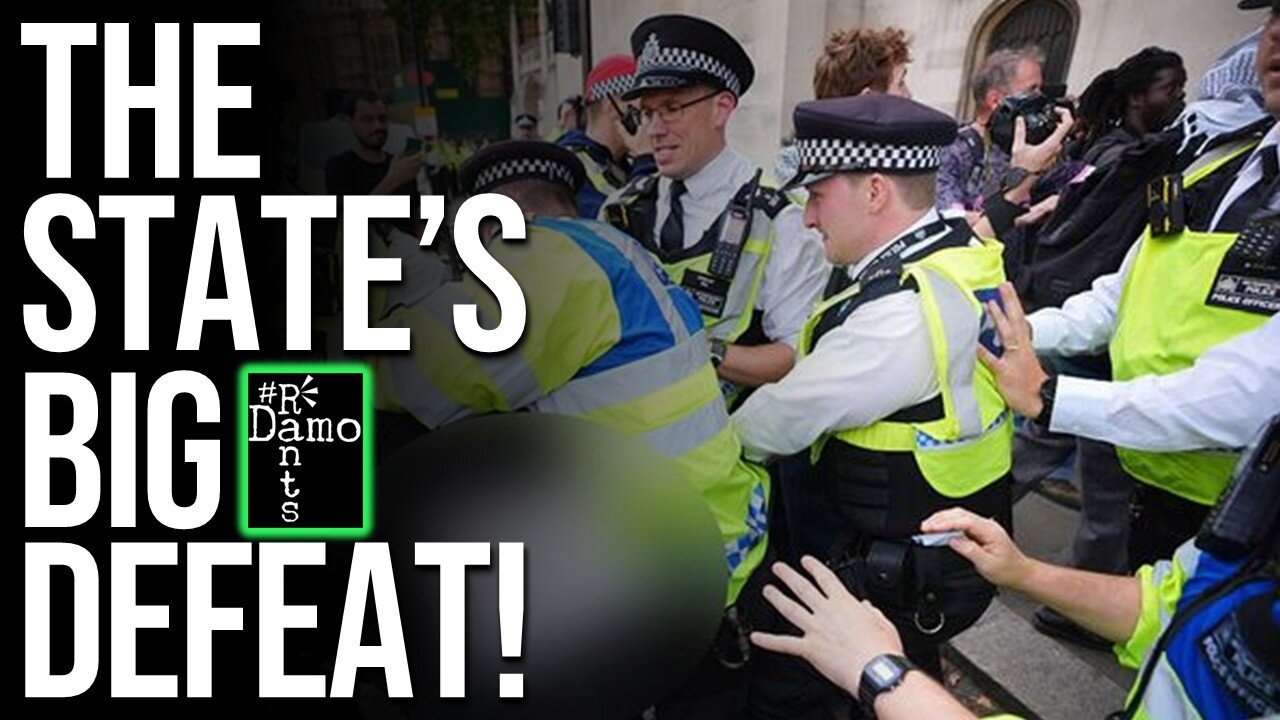Premium Only Content

Police Arrest 900 Protesters - But Palestine Action Get The Last Laugh
Right, so Britain has just spent ten million pounds arresting pensioners, priests, a blind man in a wheelchair for the second time and even apparently a mannikin - all under terrorism laws - for the unthinkable crime of holding placards once again in Parliament Square in support of Palestine Action. Nearly nine hundred people were bundled into vans, cuffed, and branded as extremists. Holocaust descendants were processed as though they were Al-Qaeda. Healthcare workers in scrubs were told they were national security threats. It would be comical if it wasn’t so chilling: a state criminalising conscience in the name of counter-terrorism.
Yet while the Met was busy terror-labelling the vulnerable and the defiant, Elbit Systems, Palestine Action’s favourite target was already packing its bags. Its Bristol factory, leased until 2029, sat abandoned, guarded only by a lone security man. It was the third closure in three years, following retreats in Oldham and London, each forced by Palestine Action’s rooftop occupations, blockades, and relentless disruption.
So herein lies the contradiction: a government unleashing its terrorism laws on citizens to defend a war profiteer, and a war profiteer retreating anyway. The state flexes its muscles in Westminster, but the company it shields folds in Bristol. And that leaves the question hanging — if even Elbit no longer believes it can win, how long before the state itself finally admits the same?
Right, so this past weekend as we’ve now seen on many a weekend before it now, Britain revealed its contradictions in full as the Metropolitan Police, in Parliament Square, unleashed one of the largest waves of arrests in modern history, branding hundreds of ordinary citizens as terrorists. Nearly nine hundred people were detained under the Terrorism Act, for little more than sitting silently with placards or voicing support for Palestine Action, the direct-action network that has targeted Israel’s largest arms manufacturer.
At the very same moment, one of Elbit Systems’ flagship UK sites stood empty. The Aztec West facility in Bristol — leased until 2029 — was deserted, with only a security guard left on watch. Even while proscribed it seems, Palestine Action are still winning their fight against them. Elbit had already shut down its Ferranti plant in Oldham in 2022 and its Kingsway office in London in 2023 after Palestine Action’s rooftop occupations, spray-paint campaigns, and blockades. Now Bristol has it seems joined the list.
So while the British state was criminalising conscience to protect Elbit, by arresting pensioners, Jewish descendants of Holocaust survivors, disabled people and apparently at least one dummy, the company itself was abandoning its public face in the UK. Elbit survives through billion-pound government contracts, but it looks like it no longer dares show itself openly. The empty factory in Bristol, set against that backdrop of overflowing police vans in Westminster, packed with little old ladies and the like, raises an entirely justifiable question at this point therefore: has Elbit itself already concluded that Palestine Action will win the day?
The Metropolitan Police claimed necessity. They deployed over 2,500 officers and arrested nearly 900 people, with 857 detained under the Terrorism Act. Officers insisted the operation was about public safety, that violence was threatened, that Parliament needed protection. That mannikin looked at me funny, that disabled chap can’t see me at all, he must be plotting something, the ridiculousness of it all writes itself.
But the scenes in Parliament Square told another story. Protesters sat silently in rows, holding placards. Elderly pensioners leaned on sticks, priests stood in clerical collars, healthcare workers wore scrubs. Holocaust descendants carried hand-written signs. A blind man in a wheelchair, holding a banner he could not see but could believe in, waited calmly to be cuffed.
The footage showed no riot, no weapons, no mobs. What it showed was peaceful defiance - and a state branding that defiance as terrorism.
The symbolism of those arrested pierced through the state narrative like a hot knife through butter. Naomi Wimborne-Idrissi, co-founder of Jewish Voice for Labour, was detained as “arrestee number 851.” She later described the psychological tricks employed: officers playing “friendly cop” to coax out personal details, whispers that those who resisted would be shipped to Scotland, hints that queue-jumping was possible for the compliant. She spent hours in police vans and holding areas, only to be processed at Brixton in the early hours.
Carolyn Gelenter, a Jewish peace activist and descendant of Holocaust survivors, was supposed to just be an observer, but chose to join in instead. She was cuffed and dragged away, bailed in the early morning, due back in November. The image of a Holocaust descendant branded as a terrorist for opposing genocide being committed by a so-called Jewish state made a mockery of government claims.
Most shocking was once again the sight of Mike Higgins, a sixty-two-year-old blind pensioner in a wheelchair. Arrested once already last month, he returned this weekend undeterred. When officers arrested him again under terrorism laws, his response to it all was biting: “And I’m a terrorist? That’s the joke of it. Of course I’ll keep coming back. What choice do I have?” His insistence on braille communication from police highlighted not just repression but an expectation of systemic inaccessibility, quipping “we’ll see if that happens.”
These were not extremists. They were symbols. By arresting them, the state destroyed its own claim to legitimacy. Under no circumstances can these people be reasonably seen to be terrorists, highlighting the stupidity and over reach of the Starmer regime.
The use of the Terrorism Act was not incidental. It was deliberate, and it was grotesque. Legislation written to tackle Al-Qaeda and ISIS has turned inward on citizens holding placards for no other reason than to protect Israeli interests. Their arms interests. Arms being used for genocide. By stretching “terrorism” to cover support for Palestine Action, the state created a precedent: dissent itself can be branded extremist any time they see fit. This is why the judicial review in November is so important.
This should terrify more than those who care about Palestine. It sets a template for criminalising climate movements, anti-war campaigns, or even trade unions. If a placard can be terrorism, then anything can.
And yet, the deployment was chaotic. Custody suites across London overflowed. Detainees were transported to Bromley, Heathrow, Harrow, Barking. Some were told they might end up in Bournemouth or Scotland. Officers themselves complained of twenty-five-hour shifts, cancelled leave, and logistical meltdown, but it’s their choice to follow orders.
What was intended as a show of force looked instead like a system at breaking point. The state had arrested more people than it could process at once. It had overreached. And that overreach exposed its brittleness.
The financial cost underlined the absurdity. The Independent reported that September’s operations alone would cost at least £10 million.
This is money spent not on repairing social services or investing in communities, or protecting those communities, but on arresting communities. Disabled protesters like Higgins were arrested at vast expense while disability services remain gutted by austerity. Local councils warn of insolvency, yet tens of millions are poured into policing placards. When was the last time any of these officers prosecuted a mobile phone theft? What are the police for anymore, when the waste of resources on something like this appal so many of us?
How sustainable is this? How long can the state justify this drain for an operation that fails to achieve its stated aim? Elbit still shut Bristol. Protesters still returned. If anything, sympathy has grown. Each arrest costs money and legitimacy. Each image of police dragging away pensioners costs trust. At what point does the price of suppression outweigh the benefits?
While Westminster was flooded with police vans, Bristol’s Aztec West stood silent. Elbit had walked away. Staff gone, operations ceased, lease abandoned until 2029. This was a company that, on paper, had everything on its side: government backing, billions in contracts, the full force of the Terrorism Act seemingly mobilised in its defence. And yet it folded.
This was no isolated retreat. Each time, Palestine Action’s direct action campaigns — rooftop occupations, blockades, spray-painted walls — made business impossible. Each time, Elbit preferred to cut its losses rather than endure the reputational damage.
The Bristol closure shows that proscription has not broken Palestine Action. It has not even slowed it. If anything, it has vindicated the activists’ claim: direct action works. Historical record says they’re right too, we have a long history of direct action in this country. When petitions fail, when Parliament refuses, when ministers criminalise dissent, physical disruption achieves what legality cannot.
And the timing asks the most provocative question of all: if Elbit felt protected by proscription, why retreat? Was this an implicit concession that the ban will not hold up in court? Or an admission that proscription cannot stop reputational collapse? Has Elbit itself already lost faith in the British state’s ability to protect it?
Elbit has not disappeared. It is still winning billion-dollar deals abroad. Its order backlog stood at $23.1 billion in 2025, with two-thirds of sales outside Israel. It recently signed a $1.635 billion defence deal in Serbia and a $130 million rocket system contract. Financially, it thrives.
But the geography of that survival matters. In Britain, Elbit is retreating from public view. It can no longer maintain factories or offices in communities. Instead, it burrows into government contracts shielded from scrutiny. Reports abound that the Ministry of Defence is preparing to award it a £2–2.5 billion, fifteen-year contract to run military training infrastructure to them.
This is survival by patronage, not by legitimacy and it switches the focus from factories to the government itself, the same government proscribing those protesting against it. A company that cannot keep its own buildings open must survive by embedding itself in the state’s bureaucracy and the government is rolling out the red carpet to them in that regard it seems. They hide in backrooms, behind classified training programmes, out of public sight.
But dependence is weakness too. A firm that relies on state subsidy for survival is exposed to political shifts. Public outrage grows. International courts investigate genocide. What happens when the cost of protecting Elbit outweighs its usefulness? Contracts can be cancelled. Reputation, once lost, cannot.
Amid this clash of state repression and corporate retreat, the protesters themselves stand out as symbols of moral authority. Naomi Wimborne-Idrissi exposes the lie that Palestine Action supporters are violent extremists. Carolyn Gelenter, a Holocaust descendant, embodies the moral inversion of arresting Jews for opposing genocide. Mike Higgins, a blind man in a wheelchair, personifies the absurdity of branding the vulnerable as terrorists.
Each of these stories is an image. Higgins cuffed in his chair, helpless but defiant. Gelenter dragged away, her family history of survival mocked by the state. Wimborne-Idrissi recounting threats of long-distance transfers, exposing the psychological warfare of the Met. These images cut through the fog of state rhetoric. They show where legitimacy truly lies.
States criminalise dissent when they cannot answer it. Corporations retreat into state cover when they lose social licence. It happened with the suffragettes, branded criminals until their victory was inevitable. It happened at Orgreave, where police violence delegitimised state authority. It happened under apartheid, where companies clung to government contracts even as the world turned away.
Each time, repression failed. Each time, the side of legitimacy prevailed. Each time, history judged not the state’s force but the people’s persistence.
So who is winning? The state can count its arrests. Elbit can count its contracts. But the protesters can point to an empty factory in Bristol now.
Force without legitimacy collapses. Contracts without consent crumble. Proscription without acceptance fails. The contradiction of this September weekend tells the story. Police vans filled with pensioners and priests. A factory emptied of staff, guarded by a lone man. One side flaunts repression; the other forces retreat.
But the question that remains is this though: does Elbit already believe it cannot win? Its retreat suggests it does. And if even Elbit doubts the state’s ability to protect it, how long before the façade falls completely?
History will not remember the number of people processed through custody that weekend. It will remember the image of a blind man branded a terrorist, of a Holocaust descendant dragged away, and of a deserted factory in Bristol. These are the emblems of a strategy collapsing in real time.
The British government can criminalise conscience. Elbit can hide in the shadows of government contracts. But neither can erase the truth: direct action works, legitimacy lies with the protesters, and repression has already begun to backfire.
It’s not like the Starmer regime isn’t trying to justify this proscription where it can though, much being made of the allegedly independent reviewer of UK terrorism legislation backing the government’s proscription, but then this watchdog is just one man, a man married to the daughter of a major patron of UK Lawyers for Israel and who apparently stands guard outside the synagogue at that. Guarding against what exactly? It’s an endorsement that has also backfired hard, so get all the details of that story in this video recommendation here as your suggested next watch.
Please do also hit like, share and subscribe if you haven’t done so already so as to ensure you don’t miss out on all new daily content as well as spreading the word and helping to support the channel at the same time which is very much appreciated, holding power to account for ordinary working class people and I will hopefully catch you on the next vid. Cheers folks.
-
 LIVE
LIVE
LFA TV
19 hours agoLIVE & BREAKING NEWS! | WEDNESDAY 10/15/25
1,409 watching -
 UPCOMING
UPCOMING
freecastle
5 hours agoTAKE UP YOUR CROSS- CONTEND earnestly for the FAITH once for all entrusted to the Saints!
1151 -
 1:09:38
1:09:38
vivafrei
2 hours agoLiquid Death-Gate! Text Message-Gate! Ostrich-Gate! AN
57K22 -
 LIVE
LIVE
The HotSeat
1 hour agoAmericans Are Turning Back to God — While Terror Rises Again in Gaza
709 watching -
 LIVE
LIVE
Owen Shroyer
1 hour agoOwen Report - 10-15-2025 - Government Shutdown Political Slop Show Continues
1,335 watching -
 1:26:01
1:26:01
The Quartering
3 hours agoYoung Republican Smear, Woke Sidewalks Washed Away, Major Changes To X & More
90.2K34 -
 1:36:03
1:36:03
Darkhorse Podcast
4 hours agoThe 296th Evolutionary Lens with Bret Weinstein and Heather Heying
16.3K10 -
 LIVE
LIVE
StoneMountain64
1 hour agoI can't stop playing BATTLEFIELD 6
59 watching -
 1:05:17
1:05:17
Jeff Ahern
2 hours ago $0.76 earnedNever Woke Wednesday with Jeff Ahern
16.3K2 -
 1:24:59
1:24:59
Sean Unpaved
5 hours agoPrime Pulse: Yamamoto's Gem, Mendoza & Simpson's Title Quest, & NFL QB Rule Shift
31.6K1